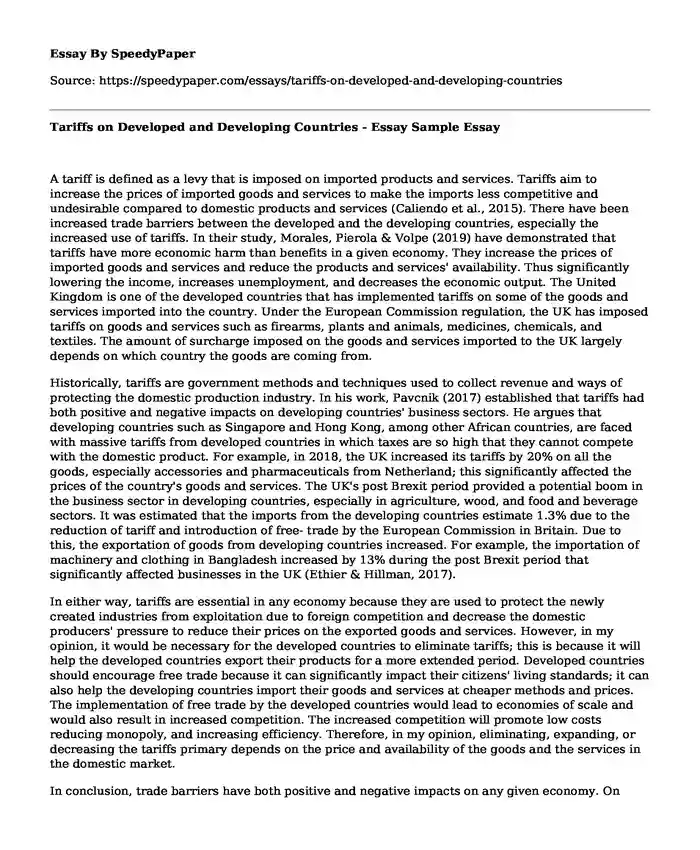A tariff is defined as a levy that is imposed on imported products and services. Tariffs aim to increase the prices of imported goods and services to make the imports less competitive and undesirable compared to domestic products and services (Caliendo et al., 2015). There have been increased trade barriers between the developed and the developing countries, especially the increased use of tariffs. In their study, Morales, Pierola & Volpe (2019) have demonstrated that tariffs have more economic harm than benefits in a given economy. They increase the prices of imported goods and services and reduce the products and services' availability. Thus significantly lowering the income, increases unemployment, and decreases the economic output. The United Kingdom is one of the developed countries that has implemented tariffs on some of the goods and services imported into the country. Under the European Commission regulation, the UK has imposed tariffs on goods and services such as firearms, plants and animals, medicines, chemicals, and textiles. The amount of surcharge imposed on the goods and services imported to the UK largely depends on which country the goods are coming from.
Historically, tariffs are government methods and techniques used to collect revenue and ways of protecting the domestic production industry. In his work, Pavcnik (2017) established that tariffs had both positive and negative impacts on developing countries' business sectors. He argues that developing countries such as Singapore and Hong Kong, among other African countries, are faced with massive tariffs from developed countries in which taxes are so high that they cannot compete with the domestic product. For example, in 2018, the UK increased its tariffs by 20% on all the goods, especially accessories and pharmaceuticals from Netherland; this significantly affected the prices of the country's goods and services. The UK's post Brexit period provided a potential boom in the business sector in developing countries, especially in agriculture, wood, and food and beverage sectors. It was estimated that the imports from the developing countries estimate 1.3% due to the reduction of tariff and introduction of free- trade by the European Commission in Britain. Due to this, the exportation of goods from developing countries increased. For example, the importation of machinery and clothing in Bangladesh increased by 13% during the post Brexit period that significantly affected businesses in the UK (Ethier & Hillman, 2017).
In either way, tariffs are essential in any economy because they are used to protect the newly created industries from exploitation due to foreign competition and decrease the domestic producers' pressure to reduce their prices on the exported goods and services. However, in my opinion, it would be necessary for the developed countries to eliminate tariffs; this is because it will help the developed countries export their products for a more extended period. Developed countries should encourage free trade because it can significantly impact their citizens' living standards; it can also help the developing countries import their goods and services at cheaper methods and prices. The implementation of free trade by the developed countries would lead to economies of scale and would also result in increased competition. The increased competition will promote low costs reducing monopoly, and increasing efficiency. Therefore, in my opinion, eliminating, expanding, or decreasing the tariffs primary depends on the price and availability of the goods and the services in the domestic market.
In conclusion, trade barriers have both positive and negative impacts on any given economy. On many occasions, developed countries tend to benefit via tariffs as opposed to developing countries. As much as tariffs are government tools for collecting revenue, they significantly impact the prices of the producer goods and services. In the future, for equality and the growth of the economy, both the developed and developing countries should encourage the use of free trades since it impacts their citizens' quality of life.
References
Caliendo, L., Feenstra, R. C., Romalis, J., & Taylor, A. M. (2015). Tariff reductions, entry, and welfare: Theory and evidence for the last two decades (No. w21768). National Bureau of Economic Research. https://publications.iadb.org/publications/english/document/A_Microeconomic_Look_at_the_Impact_of_Tariffs_on_Latin_American_Exports_en.pdf?download=true
Morales, F., Pierola, D., & Volpe, C. (2019). A Microeconomic Look at the Impact of Tariffs on Latin American Exports. Banco Interamericano de Desarrollo, Washington, DC. Documento inédito. https://publications.iadb.org/publications/english/document/A_Microeconomic_Look_at_the_Impact_of_Tariffs_on_Latin_American_Exports_en.pdf?download=true
Pavcnik, N. (2017). The impact of trade on inequality in developing countries (No. w23878). National Bureau of Economic Research. https://www.nber.org/papers/w23878
Cite this page
Tariffs on Developed and Developing Countries - Essay Sample. (2023, Dec 30). Retrieved from https://speedypaper.com/essays/tariffs-on-developed-and-developing-countries
Request Removal
If you are the original author of this essay and no longer wish to have it published on the SpeedyPaper website, please click below to request its removal:
- Free Essay Sample with a Cover Letter for Academic Advisor
- HRM Essay Example: The Brooklyn Hospitality Employee Retention Program
- HRM Essay Sample about Employment Strategy
- Essay Sample on Reasons Why Productivity Dropped After the Great Recession
- Essay Sample on Cultural Anthropology: Kosher Chinese
- Decoding European Politics: Leaders, Laws, and the Road to Somewhere - Essay Sample
- The Rationale for Pursuing the Nursing Profession - Essay Sample
Popular categories





